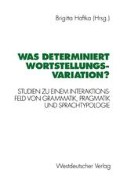Zusammenfassung
Eine der schwierigsten Aufgaben für eine Grammatik-Theorie mit universellen Ansprüchen ist es, für Wortstellungsvariation eine plausible Erklärung zu finden. In diesem Beitrag wollen wir zeigen, wie Wortfolgevariationen zwischen Sprachen sowie innerhalb einzelner Sprachen im Rahmen des “minimalistischen Programms” (Chomsky 1992) erklärt werden.
Access this chapter
Tax calculation will be finalised at checkout
Purchases are for personal use only
Preview
Unable to display preview. Download preview PDF.
Literatur
Borer, H. (1984) Parametric Syntax. Foris, Dordrecht.
Borsley, R. & M.-L. Rivero (1992) Clitic Auxiliaries in Polish. Unveröff. Mskr.
Cardinaletti, A. (1993) On Dependent Pronouns and Pronoun Movement. In: GLOW Newsletter 30, S. 18–19.
Ćavar, D. & C. Wilder (1992) Long Head Movement? Verb Movement and Cliticization in Croatian. Arbeitspapier Sprachwissenschaft in Frankfurt Nr. 7. Erscheint in Lingua.
Ćavar, D. & C. Wilder (in Vorb.) Clitic-Second in Croatian? Unveröff. Mskr.
Chomsky, N. (1991) Some Notes on Economy of Derivation and Representation. In: R. Freidin (Hrsg.) Principles and Parameters in Comparative Grammar. Cambridge, MIT Press. S. 417–454.
Chomsky, N. (1992) A Minimalist Program for Linguistic Theory. MIT Occasional Paper in Linguistics 1. Cambridge, Mass.
Corver, N. & D. Delfitto (1993) Feature Asymmetry and the Nature of Pronoun Movement. In: GLOW Newsletter 30, S. 22–23.
Holmberg, A. & C. Platzack (1988) On the Role of Inflection in Scandinavian Syntax. In: Working Papers in Scandinavian Syntax 42, S. 25–42.
Kayne, R. (1991) Romance Clitics, Verb Movement and PRO. In: Linguistic Inquiry 22, S. 647–686.
Ouhalla, J. (1991) Functional Categories and Parametric Variation. Routledge, London.
Pollock, J.-Y. (1989) Verb Movement, UG and the Structure of IP. In: Linguistic Inquiry 20, S. 365–424.
Suñer, M. (1987) Haber + Past Participle. In: Linguistic Inquiry 18, S. 683–690.
Wilder, C. & Ćavar, D. (1993) Word Order Variation, Verb Movement, and Economy Principles. Arbeitspapiere Sprachwissenschaft in Frankfurt Nr. 10.
Zec, D. & S. Inkelas (1990) Prosodically Constrained Syntax. In: S. Inkelas & D. Zec (Hrsg.) The Phonology-Syntax Connection. Chicago, Univ. of Chicago Press, S. 365–378.
Editor information
Editors and Affiliations
Rights and permissions
Copyright information
© 1994 Westdeutscher Verlag GmbH, Opladen
About this chapter
Cite this chapter
Wilder, C., Ćavar, D. (1994). X0-Bewegung und Ökonomie. In: Haftka, B. (eds) Was determiniert Wortstellungsvariation?. VS Verlag für Sozialwissenschaften. https://doi.org/10.1007/978-3-322-90875-9_1
Download citation
DOI: https://doi.org/10.1007/978-3-322-90875-9_1
Publisher Name: VS Verlag für Sozialwissenschaften
Print ISBN: 978-3-531-12490-2
Online ISBN: 978-3-322-90875-9
eBook Packages: Springer Book Archive

